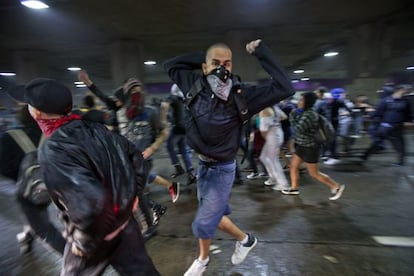Brazilians take to the streets in protest at hefty transportation hikes
Nationwide demonstrations come as the economy and Rousseff’s approval rating both sour


In violent demonstrations of the like Brazil had not seen in years, thousands of citizens took to the streets across major cities on Tuesday night to protest sharp hikes in public transportation tickets.
The protests come as many Brazilians face hardships due to high inflation and wage freezes.
In São Paulo, demonstrators marched across the city for the third night in a row on Tuesday, burning buses and clashing with police.
Authorities said they had arrested 32 people in Rio de Janeiro after violent confrontations with police spread throughout the city. Protest organizers issued a call for people to participate in another major demonstration scheduled for Thursday in the city’s central district of Cinelandia.
São Paulo state Governor Gerardo Alckimin, who has vowed to crack down on the violence, warned that charges of vandalism against the country’s heritage will be filed against any protestor who is caught destroying public property.
President Dilma Rousseff, who returned from an official visit to Portugal on Tuesday, said she was not only concerned with the demonstrations but also with the state of Brazil’s economy. The Brazilian stock market has fallen over the past few weeks, down three percent at Tuesday’s close. The country’s currency, the real, also closed at 2.20 to the US dollar.
Transport can 50 percent of a worker’s minimum monthly salary
Rousseff has also seen her approval ratings fall for the first time since she came to office in 2011. According to a recent poll her popularity has dropped eight points. On Tuesday night, she summoned Economy Minister Guido Mántega and Justice Minister José Eduardo Cardozo to the presidential palace for an emergency meeting.
In Natal, protesting students forced city officials to reduce transportation fares while in Florianopolis a strike kept 100 percent of the public buses off the streets, leaving about 500,000 people without transport.
In Brazil, ticket prices for public transportation are very high in relation to an average Brazilian salary. In São Paulo, for example, monthly round-way fares to and from work can cost 400 reals, which is more than 50 percent of a worker’s minimum monthly salary of 740 reals.
Nevertheless, middle class Brazilians, who are not accustomed to seeing large violent demonstrations, have come out in support of a police crackdown on angry crowds who continue to block the streets in major cities, creating traffic jams.
However, the growing protests across Brazil over the economy have alarmed government officials who did not witness such large turnouts during demonstrations relating to recent public corruption scandals.
Tu suscripción se está usando en otro dispositivo
¿Quieres añadir otro usuario a tu suscripción?
Si continúas leyendo en este dispositivo, no se podrá leer en el otro.
FlechaTu suscripción se está usando en otro dispositivo y solo puedes acceder a EL PAÍS desde un dispositivo a la vez.
Si quieres compartir tu cuenta, cambia tu suscripción a la modalidad Premium, así podrás añadir otro usuario. Cada uno accederá con su propia cuenta de email, lo que os permitirá personalizar vuestra experiencia en EL PAÍS.
¿Tienes una suscripción de empresa? Accede aquí para contratar más cuentas.
En el caso de no saber quién está usando tu cuenta, te recomendamos cambiar tu contraseña aquí.
Si decides continuar compartiendo tu cuenta, este mensaje se mostrará en tu dispositivo y en el de la otra persona que está usando tu cuenta de forma indefinida, afectando a tu experiencia de lectura. Puedes consultar aquí los términos y condiciones de la suscripción digital.








































